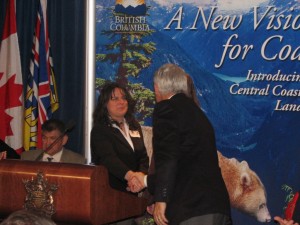July 14, 2010
George Hoberg
Yesterday, the Globe and Mail reported that Bill Bennett, BC’s Minister of Energy, Mines, and Petroleum Resources referred to environmentalists campaigning to turn the Flathead Valley in the southeastern corner of the province into a National Park as “eco-facists” (sic). The minister (who recently replaced Blair Leckstrom who resigned over the HST) explained afterwards that he did not author the email. He stated that it was sent out by a new staffer who was not sufficiently familiar with the office’s review policies.
Even if the Minister was not the author of the email that went out under his name, the incident raises two interesting questions. The first is about the relationship between constituency politics and cabinet duties. Bennett’s portfolio of energy and mines would be directly involved in any decision about the fate of the Flathead. Do cabinet ministers normally engage in such blatant attack politics on issues so close to their portfolio? According to the Vancouver Sun, Bennett apologized for the use of the word fascist (although not, apparently, its misspelling), but not for the content or tone of the message. Here’s an extract from the message reported by the Sun:
“These ‘protectors’ of the earth will use whatever legal, political, dishonest means they can muster. They are like the colonizers of history. They love to add another chunk of their favourite colour to the map of the world. We either stand strong together against the loss of the Flathead Valley to the eco facists [sic], or we will lose the Flathead.”
Even deleting the misspelled f-word, that is pretty harsh rhetoric for someone who needs to have an effective working relationship with the environmental community, not only on the Flathead, but on a broad range of challenging and divisive energy and mining issues facing the province.
The second question raised is whether the email reflects a new rhetorical turn for the BC Government. The email incident got me thinking about some other signature moments in the history of the Government of BC’s rhetoric on environmentalists. In the mid-1990s, when environmentalists launched their campaign to protect the Great Bear
Rainforest, NDP Premier Glen Clark denounced them as “enemies of BC.” That characterization was enormously hurtful to many environmentalists and represented a significant setback in personal and political relations between the government and the environmental community. A decade later, when he announced the government’s plan to protect the Great Bear Rainforest in February 2006, BC Liberal Premier Gordon Campbell shared the stage with

Premier Campbell congratulating the Sierra Club's Lisa Matthaus for her contributions to the Great Bear Rainforest agreement in 2006
leading environmentalists, and during his remarks, he made a deliberate point of referring to leaders of Greenpeace, ForestEthics, and the Sierra Club as his friends and he thanked them for their contributions. While that may have been a rare moment of consensus in a long history of confrontation, I nonetheless understood it to be recognition of the futility and corrosiveness of incendiary political rhetoric from the Government.
That is why I find Bennett’s email so troubling, whether or not it used the f-word and whether or not an inexperienced staffer typed it. It may be a signal of heightened combativeness on behalf of the Government. History has shown that is unproductive politically and environmentally.

Pingback: IAN
Pingback: JULIO